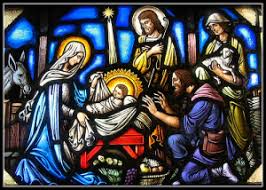
As recently as 125 years ago, some of the world’s brightest thinkers solemnly declared human beings would never fly.
They were wrong.
About the same time, engineers confidently predicted that the long-distance transmission of pictures was contrary to the laws of physics. They were wrong, too.
These days science fiction fans are desperately hoping that the world’s most eminent physicists are wrong when they assert that time travel is impossible. Apparently we’ll just have to settle for Marty McFly visiting his high-school-age parents in Back to the Future.
But in one important regard, anyone can visit the past. Our time machine is music.
Every time we encounter the songs and lyrics crafted by previous generations – especially when they are accompanied by original instrumentation – we draw close to those who have gone before us. Music is our doorway to hearing the sounds they heard, and to experiencing their thoughts and feelings.
That’s never more true at Christmastime than when we experience Of the Father’s Love Begotten. This beautiful song transports us to the early Middle Ages almost 17 centuries ago – a mere 300 years after the time of Jesus – and almost certainly deserves the title of oldest carol still being actively sung in the 21st century.
Aurelius Prudentius Clemens (A.D. 348-413), one of Christianity’s earliest poets, penned the original words in Latin. They were ultimately set to the tune Divinum Mysterium:
Of the Father’s love begotten, ere the worlds began to be
He is Alpha and Omega, He the source, the ending He
Of the things that are, that have been, and that future years shall see
Evermore and evermore.
O, that birth forever blessed, when the Virgin full of grace
By the Holy Ghost conceiving, bore the Savior of our race
And the Babe, the world’s Redeemer, first revealed His sacred face
Evermore and evermore.
Check out Michael Lining’s gracious rendition of this ancient song. By recording his own unaccompanied voice four times, he captures the haunting beauty of medieval chant.
It’s impossible to get to the depths of what it means that God became a human being at a real place at a real time in a real family. The most celebrated biblical description of this event is found in the opening verse of the gospel of John:
In the beginning was the Word, and the Word was with God, and the Word was God. (John 1:1)
That verse is like thick bread. It nourishes inquiring minds.
“In the beginning” is the Bible’s way of saying that Jesus has always existed. Jesus isn’t part of creation. He himself is the co-creator of everything that exists.
What does John mean by calling Jesus “the Word”? That means he is the sum total of everything God wants to say. You can catch a flavor of that whenever a hip-hop artist says, “Word.” The entire thrust of a song is reduced to four letters: “Word. You got my message? You hear what I’m saying?” Jesus is the complete Word, or communication, from our Father in heaven.
John goes on, “and the Word was with God.” In the Greek language there are two words that are translated “with” – sun and pros. Sun means “alongside.” It’s the prefix for words like sym-phony. In a symphony all the instruments are playing alongside each other.
Pros, however – which is the word John uses here – is different. It means to be “with” someone in spirit and purpose. When a commanding officer says to his troops, “I intend to take that hill. Are you with me?” it would be less than helpful for the troops to answer, “Of course we’re with you; we’re standing right here!” What the officer really wants to know is whether they are “with” him. Can he truly count on them when their lives are on the line?
That’s what John says about Jesus. He is pros or “with” the Father in everything the Father wants to accomplish.
Which brings us to the mysterious phrase, “and the Word was God.” The astonishing truth is that God, by nature, is plural.
This is often misunderstood. Bertrand Russell, the celebrated British atheist, once said, “I cannot believe in a religion whose first premise is an outright contradiction – that one is three and three are one.” But Russell overlooked something obvious – that God is one in the category of being (that is, there is only one God), but three in a very different category, that of personhood. God is Father, Son and Holy Spirit. We can truly say that God is a society.
Since God is so utterly different from us, how can God ever get “the Word” to us in a form we can possibly understand?
Throughout the Old Testament, God sends messages to earth. Through the prophets, God sends words to help us understand who he is. Then, at Bethlehem, God does something fundamentally different. God sends The Word.
That’s the meaning behind John 1:14: “The Word became flesh and made his dwelling among us.” Or as Eugene Peterson so memorably puts it in his paraphrase of the Bible called The Message: “The Word became flesh and blood and moved into the neighborhood.” God revealed himself by becoming one of us.
J. Robert Oppenheimer, director of the Manhattan Project, suggested, “The best way to present an idea is to wrap it up in a person.”
Or as a little girl once said in Sunday School, “People couldn’t hear God’s whisper, so he said it out loud through Jesus.”
Of the Father’s Love Begotten tries to say out loud what we all need to hear:
By God’s grace and power, and the incredible gift of music, we can go back in time to experience the Father’s final Word concerning grace, truth, and love.
